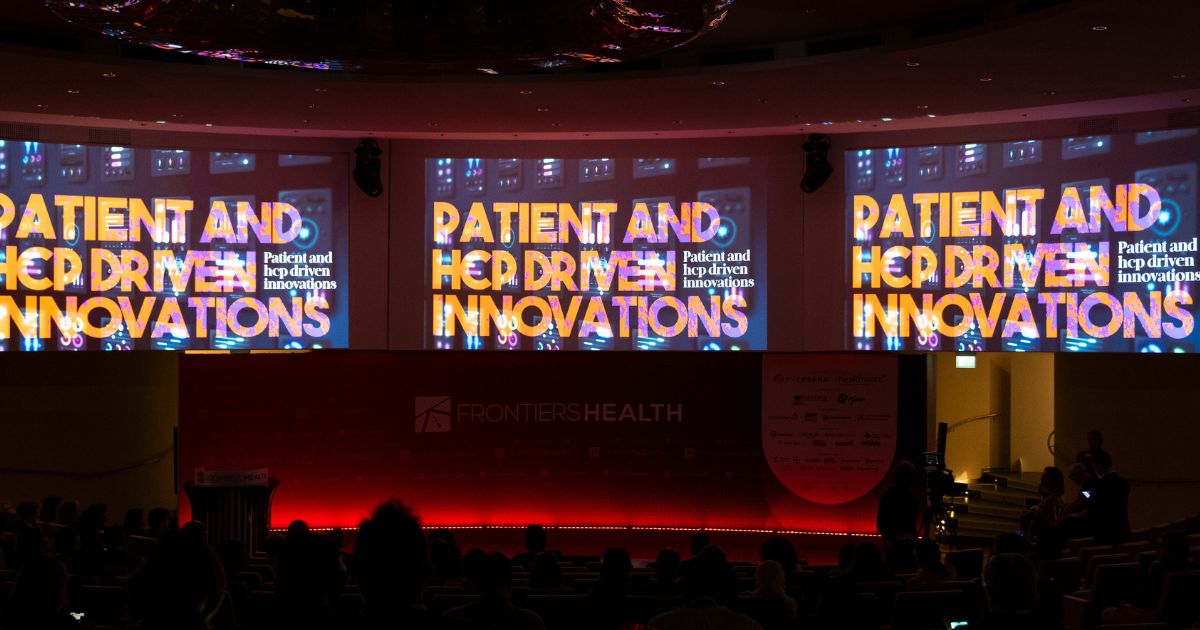Championing Patient Perspectives in Health Innovation
In this article, Luigi Pavia, who leads our Ecosystem Engagement & Partnerships, analyses how we give centrality to the voice of patients thanks to the variety of formats, the breadth of topics explored and our mission to support the healthcare innovation ecosystem.
In the dynamic ecosystem of Frontiers Health, the significance of patients transcends a mere participatory role; their active involvement is paramount. Patients contribute invaluable recommendations regarding innovative solutions, actively engage with healthcare professionals (HCPs), and bring forth a unique perspective that stands as a cornerstone in our collective mission to shape the future of healthcare.
Our commitment to incorporating the patient’s voice as a catalyst for positive change is unwavering. This approach is not confined to a singular edition but has been a consistent thread woven into the fabric of each iteration of Frontiers Health. The patient theme, considered not only a topic but a pivotal force, has played a central role in our discussions and exchanges. Recognizing the transformative potential that patients embody, we persist in championing their insights and experiences, understanding that their perspectives are invaluable in steering the trajectory of healthcare innovation toward a patient-centered future.
Frontiers Health 2023
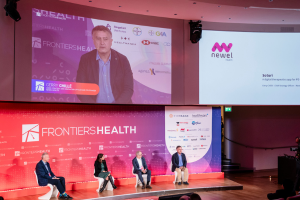 The 2023 edition of the Frontier Health Global Conference, hosted in Rome, was meticulously crafted to offer an even more immersive and enriching experience, featuring additional guiding themes and several complementary side events. Notably, the role of patients served as a pervasive theme, woven seamlessly throughout the entire two and a half days.
The 2023 edition of the Frontier Health Global Conference, hosted in Rome, was meticulously crafted to offer an even more immersive and enriching experience, featuring additional guiding themes and several complementary side events. Notably, the role of patients served as a pervasive theme, woven seamlessly throughout the entire two and a half days.
Indeed, we kicked off the event with a plenary keynote starting from a patient’s experience. Beyond the conventional perception of patients as mere subjects for clinical trial enrollment, their role in clinical development extends far beyond, particularly in the context of rare diseases. Patients wield significant influence, from spearheading advocacy efforts to shaping policies and regulations. Their impact stretches to improving study design, influencing endpoint selection, and dismantling data silos while championing the adoption of cutting-edge technologies.
Based on such assumptions, the keynote explored tangible examples illustrating the profound partnership potential between the industry and patient organizations. Presented through the lens of a mother passionately advocating for a treatment to address the rare and presently untreatable disease affecting her own daughter, the keynote shed light on the transformative role patients can play in reshaping the landscape of clinical development. This compelling narrative emphasizes the need for collaborative alliances between bio-pharma and patient communities to realize breakthroughs in the face of challenging medical conditions.
- Watch the session: From Patients to Partners: the unique role of Patient Organizations in accelerating Clinical Development for Rare Diseases
Later, we proposed out attendees a discussion on a progressive and unified strategy aimed at diagnosing and eventually treating neurodegenerative diseases. The emphasis was on patients, with discussions revolving around recent breakthroughs in innovative biomarkers and drug therapies that have the potential to revolutionize the treatment landscape for these conditions. Esteemed speakers discussed the creative utilization of wearable technologies seamlessly integrated with data science and human-centered design. This patient-centric approach enables the gathering of real-world data from individuals living with neurodegenerative diseases, paving the way for the development and delivery of highly personalized care and treatment recommendations. The overarching goal of the session was to emphasize the future of neurology, where an enhanced understanding of neurological conditions, coupled with pioneering therapies and technologies, brings forth renewed hope and possibilities in addressing the challenges posed by these complex health issues.
In the structure of the 2023 agenda, we designed a thematic session devoted to Patient and HCP driven innovations. Within this framework, several types of organizations, experts, healthcare professionals and patients debated on multiple topics:
- As healthcare professionals (HCPs) and patients become more involved in creating and leading innovations in various therapy areas, what does this change mean for the industry? This new approach has been analyzed as it’s reshaping the interaction between companies, HCPs, and patients, and it’s influencing their strategies for innovation.
- Innovations developed by patients and HCPs have been explored.
- Recently, there has been a heightened focus on lifestyle and behavior change among both patients and clinical staff to improve outcomes. A novel workforce is emerging, employing evidence-based, science-backed, behavior-driven techniques that have demonstrated superior results for patients. The way this remarkable workforce can be utilized in patient support programs and beyond has been extensively explored.
- Watch the session: Patient and HCP driven innovations
Frontiers Health 2022
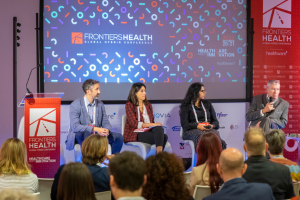 In ideal continuity with the discourse elaborated across the previous editions, at FH22 we embarked on an engaging and interactive session on patient centricity. We aimed to creatively ‘hack’ the concept, endeavoring to construct a comprehensive model. This model is envisioned to encapsulate the essential elements that life science companies, digital health providers, and health systems must incorporate to genuinely fulfill the desires of patients within the dynamic landscape of the digital world. Our collective exploration specifically addressed critical facets such as diagnosis, treatment, information dissemination, support mechanisms, and the pivotal realm of data and personalization.
In ideal continuity with the discourse elaborated across the previous editions, at FH22 we embarked on an engaging and interactive session on patient centricity. We aimed to creatively ‘hack’ the concept, endeavoring to construct a comprehensive model. This model is envisioned to encapsulate the essential elements that life science companies, digital health providers, and health systems must incorporate to genuinely fulfill the desires of patients within the dynamic landscape of the digital world. Our collective exploration specifically addressed critical facets such as diagnosis, treatment, information dissemination, support mechanisms, and the pivotal realm of data and personalization.
By navigating through these diverse dimensions, we aspired to unearth innovative strategies that could significantly enhance outcomes and align healthcare services more closely with the evolving needs and expectations of patients.
- Watch the session: Patient centricity in a digital world
Frontiers Health 2021
At FH21 we return to a physical gathering, even though with physical restrictions. In Milan, we continued going in depth on the patients’ role. Promoting active involvement by patients is a vital factor in the success of developing and bringing to market both conventional pharmaceuticals and digital health solutions. It goes beyond mere communication and requires meaningful collaboration and input from patients in various demographics, involving both patient organizations and individual representatives. We debated about the fact that this engagement should be integrated into multiple internal functions beyond communication alone. Yet, for numerous companies, this aspect remains an underutilized opportunity.
We held an interactive workshop focused on: the significance of patient engagement and input in life sciences; Identifying the crucial components of effective patient engagement; assessing your organization’s readiness for patient engagement and pinpointing areas for enhancement.
Then we slightly shifted our focus on the concept of patient empowerment. Striving to establish a healthcare system centered around humanity, focus was on democratizing health by empowering patients and citizens to gain knowledge and take responsibility for their own well-being.
Engaging with a patient-entrepreneur and visionary leaders in consumer health, biotech, AI ethics, and digital health, our discussions revolved around the extent to which current technological advancements facilitate—or hinder—patients, as well as all consumers, in effectively managing, co-designing, and ultimately making informed decisions about their health.
- Watch the session: Citizens and Patients Empowerment
Frontiers Health 2020
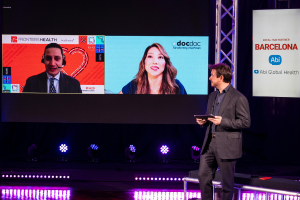 In 2020, the world witnessed the apex of the COVID-19 pandemic, a challenging period that demanded unprecedented efforts to address healthcare needs. During this critical time, Frontiers Health dedicated substantial resources and commitment to shed lights patient-focused solutions and facilitating crucial discussions. Recognizing the urgency of the situation, the organization proactively engaged in supporting initiatives that prioritized the well-being of patients. This included fostering dialogue on innovative healthcare solutions and strategies to enhance patient care in the face of the pandemic’s unique challenges. Frontiers Health played a pivotal role in contributing to the collective efforts aimed at addressing the healthcare demands brought about by the extraordinary circumstances of 2020.
In 2020, the world witnessed the apex of the COVID-19 pandemic, a challenging period that demanded unprecedented efforts to address healthcare needs. During this critical time, Frontiers Health dedicated substantial resources and commitment to shed lights patient-focused solutions and facilitating crucial discussions. Recognizing the urgency of the situation, the organization proactively engaged in supporting initiatives that prioritized the well-being of patients. This included fostering dialogue on innovative healthcare solutions and strategies to enhance patient care in the face of the pandemic’s unique challenges. Frontiers Health played a pivotal role in contributing to the collective efforts aimed at addressing the healthcare demands brought about by the extraordinary circumstances of 2020.
The significance of incorporating digital health solutions into conventional healthcare systems has been underscored by the COVID-19 pandemic. When envisioning the healthcare systems of the future, it’s crucial to recognize that technology represents just one facet of the equation. For this reason, we invited an expert to discuss the pivotal role of empowering patients to make informed, data-driven healthcare decisions. We discovered how the amalgamation of AI and human interaction can optimize overall outcomes for patients, doctors, and insurers alike in the evolving landscape of healthcare.
- Watch the session: Combining the power of AI with human expertise: How to build a patient-centric healthcare ecosystem in a post-covid world
Then, we focused on the global emergence of new virtual care models that contribute to shaping the role of the ‘connected patient.’ In 2020, operations within the health innovation market signaled a shift towards a new paradigm in healthcare, enabling the integration of connected devices with data science and real-time access to care seamlessly. This transformative approach aims to enhance patients’ lives. Forecasts suggest that in the next few years, we should expect a continued evolution in healthcare, resulting in improved clinical outcomes, enhanced patient well-being, and the cultivation of an entirely new industry centered around healthcare.
- Watch the session: The connected patient: global emergence of new virtual care models
Furthermore, we hosted a specific patient-centricy discussion, which started from the assumption that the COVID-19 pandemic has significantly hastened the transformation of our comprehension of true patient centricity. Human-centered healthcare demands a comprehensive understanding of individuals, considering both their complete identity and the broader context of how an illness affects various facets of their lives. The integration of consumer digital technologies is propelling us beyond merely addressing individual patient needs; we are now delving into the potential to support entire populations through early detection and prevention, ultimately envisioning a paradigm shift that could revolutionize the entirety of healthcare in the future.
- Watch the session: Patient Centricity. More needed and more real than ever before
Frontiers Health 2019
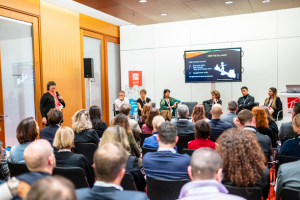 Considered prominent views in our ecosystem, in 2019 we kept exploring angles and perspectives related to patients. Placing the patient at the forefront, patient centricity involves prioritizing open and sustained engagement to achieve the best possible experience and outcomes for the individual and their family with respect. We hosted a session discussing the inherent link between patient-centricity and digital health. This exploration featured testimonials from patients, pharmaceutical representatives, healthcare professionals, and start-ups, and we recorded an active audience participation, agreeing on the concept that enhancing the well-being of patients necessitates a profound comprehension of their medical conditions, experiences, needs, and priorities.
Considered prominent views in our ecosystem, in 2019 we kept exploring angles and perspectives related to patients. Placing the patient at the forefront, patient centricity involves prioritizing open and sustained engagement to achieve the best possible experience and outcomes for the individual and their family with respect. We hosted a session discussing the inherent link between patient-centricity and digital health. This exploration featured testimonials from patients, pharmaceutical representatives, healthcare professionals, and start-ups, and we recorded an active audience participation, agreeing on the concept that enhancing the well-being of patients necessitates a profound comprehension of their medical conditions, experiences, needs, and priorities.
- Learn more at: Patient Centricity and Digital Innovation
During the 2019 edition, we at Frontiers Health were also delighted to host a pharma’s initiative aiming at discovering startups providing concrete solutions to improve patients experience in 3 areas: advanced Pulmonary Arterial Hypertension; Cardiovascular diseases; chronic pain.
Frontiers Health 2018
In the articulated FH18 agenda, we designed a specific discussion panel, starting from the assumption that we all part of the healthcare landscape because we share a common commitment to prioritize and care for patients. However, we’re aware that transforming any established structure or organization into one that is truly patient centered poses a significant challenge.
The Institute of Medicine has articulated patient-centeredness as the provision of care that respects and responds to individual patient preferences, needs, and values, ensuring that patient values guide all clinical decisions.
The session we proposed delved into the concept of patient-centricity from both the patient and organizational perspectives. Firstly, we gathered insights from patients, professionals in pharmaceutical and device companies, as well as digital health specialists. Subsequently, our speakers transitioned to a collaborative brainstorming phase, where they collectively identified and defined best practices in achieving patient-centricity.
- Learn more: On the Road to Patient-Centricity
Frontiers Health 2017
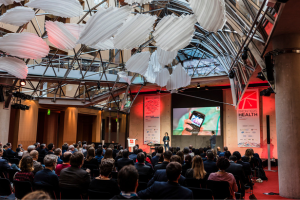 Besides, the various presentations of startups proposing innovative solutions to positively impact patients’ lives, at FH17 we hosted a session where a family, guided by the belief that all children should be equal at birth, dediced to create a startup with the aim to ensure a better future for young stroke survivors, children with a disability of cerebral palsy and their families.
Besides, the various presentations of startups proposing innovative solutions to positively impact patients’ lives, at FH17 we hosted a session where a family, guided by the belief that all children should be equal at birth, dediced to create a startup with the aim to ensure a better future for young stroke survivors, children with a disability of cerebral palsy and their families.
- Learn more at: FightTheStroke
Frontiers Health 2016
FH16 put the patients at the center of its rich and insightful exploration of the latest in the health innovation space.
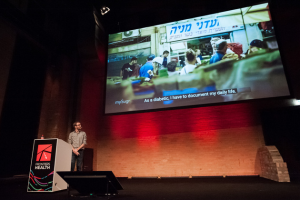 Specifically, besides many brilliant CEOs whose ideas emerged from their own personal experience as patients, part of the debate was about the apps qualified as medical devices. Since apps are essentially consumer products, maintaining their appeal is crucial. The challenge lies in harmonizing both aspects. So, it’s crucial creating impactful and medically certified digital health solutions that prioritize and empower patients dealing with chronic conditions. Drawing from the insights gathered from mySugr, an application aiding almost a million individuals managing diabetes in their daily lives, we hosted a talk exploring effective strategies.
Specifically, besides many brilliant CEOs whose ideas emerged from their own personal experience as patients, part of the debate was about the apps qualified as medical devices. Since apps are essentially consumer products, maintaining their appeal is crucial. The challenge lies in harmonizing both aspects. So, it’s crucial creating impactful and medically certified digital health solutions that prioritize and empower patients dealing with chronic conditions. Drawing from the insights gathered from mySugr, an application aiding almost a million individuals managing diabetes in their daily lives, we hosted a talk exploring effective strategies.
- Learn more at: Medical Quality + Consumer Appeal = Impact
The discussion evolved over other conference sessions. Far too frequently, the healthcare journey for individuals is marked by disorder—a series of haphazard, disjointed interactions involving patients, professionals, blood samples, images, and paperwork.
While digitalization is often presented as a remedy for this issue, it frequently merely shifts the chaos to a different platform. So, we tried to shed light on the potential of creating patient-centric pathways, offering profound innovation in digital health and medical technology. This approach aims to streamline and enhance the experiences of both patients and professionals, fostering a more organized and effective healthcare system
- Learn more at: Designing pathways around people
Continuing the discourse, we got to explore the convergence of the “EPatient” with the evolving Digital Healthcare Market, reflecting on the possibility that the Landscape could merge with the traditional healthcare systems. We considered Germany as an example, where 40 million individuals and patients engaged in online healthcare exploration, navigating through a plethora of health-related websites, apps, and startups. In that specific year, back in 2016, traditional players in the healthcare system often found themselves at a disadvantage. Notably, we were witnessing a growing trend where digital interventions from startups intersect with established medicare touchpoints, giving rise to innovative digital care scenarios.
- Learn more at: The EPatient And The Digital Healthcare Market: Is This Online Market Converging With The Traditional Healthcare System
What to expect at FH24?
With the variety of formats, the breadth of themes explored, and our mission to support the health innovation ecosystem we will continue to emphasize the critical voice of patients in our overall strategy and initiatives in driving the future of health. Join us at FH24 to be a part of this journey.

